1999 TOYOTA TACOMA tow
[x] Cancel search: towPage 162 of 247
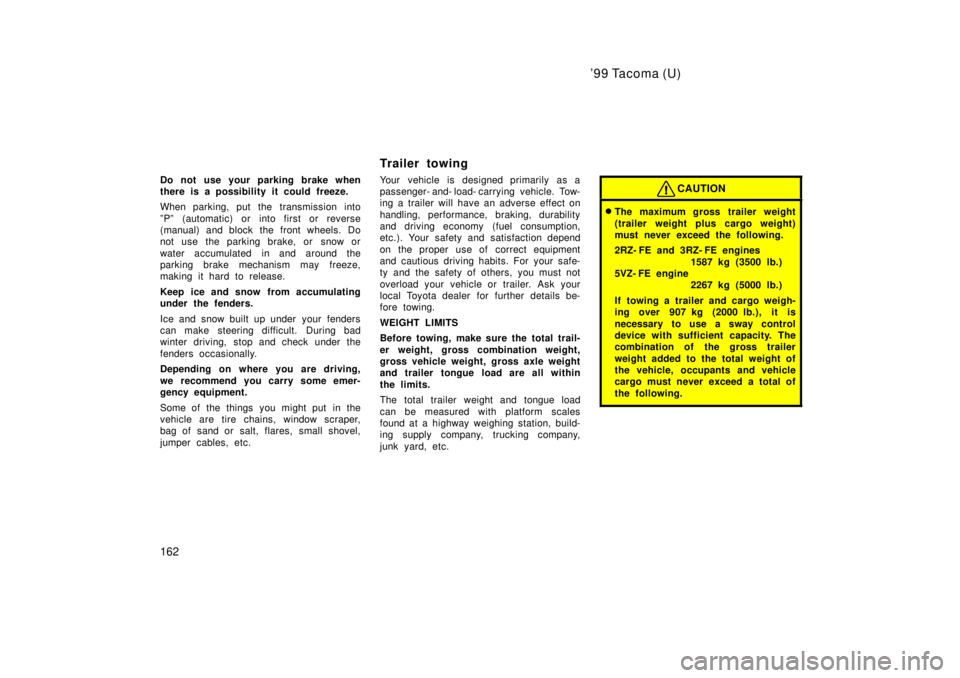
'99 Tacoma (U)
162
Do not use your parking brake when
there is a possibility it could freeze.
When parking, put the transmission into
ºPº (automatic) or into first or reverse
(manual) and block the front wheels. Do
not use the parking brake, or snow or
water accumulated in and around the
parking brake mechanism may freeze,
making it hard to release.
Keep ice and snow from accumulating
under the fenders.
Ice and snow built up under your fenders
can make steering difficult. During bad
winter driving, stop and check under the
fenders occasionally.
Depending on where you are driving,
we recommend you carry some emer-
gency equipment.
Some of the things you might put in the
vehicle are tire chains, window scraper,
bag of sand or salt, flares, small shovel,
jumper cables, etc.
Trailer towing
Your vehicle is designed primarily as a
passenger- and- load- carrying vehicle. Tow-
ing a trailer will have an adverse effect on
handling, performance, braking, durab
ility
and driving economy (fuel consumption,
etc.). Your safety and satisfaction depend
on the proper use of correct equipment
and cautious driving habits. For your safe-
ty and the safety of others, you must not
overload your vehicle or trailer. Ask your
local Toyota dealer for further details be-
fore towing.
WEIGHT LIMITS
Before towing, make sure the total trail-
er weight, gross combination weight,
gross vehicle weight, gross axle weight
and trailer tongue load are all within
the limits.
The total trailer weight and tongue load
can be measured with platform scales
found at a highway weighing station, build-
ing supply company, trucking company,
junk yard, etc.
CAUTION
� The maximum gross trailer weight
(trailer weight plus cargo weight)
must never exceed the following.
2RZ- FE and 3RZ- FE engines
1587 kg (3500 lb.)
5VZ- FE engine 2267 kg (5000 lb.)
If towing a trailer and cargo weigh-
ing over 907 kg (2000 lb.), it is
necessary to use a sway control
device with sufficient capacity. The
combination of the gross trailer
weight added to the total weight of
the vehicle, occupants and vehicle
cargo must never exceed a total of
the following.
Page 163 of 247
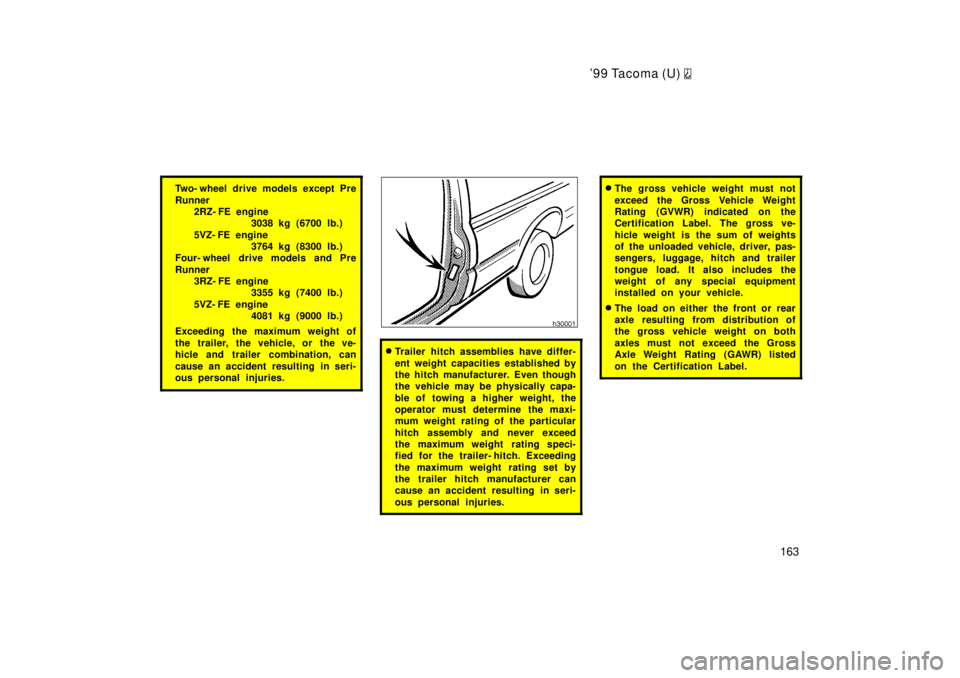
'99 Tacoma (U)
163
Two- wheel drive models except Pre Runner2RZ- FE engine 3038 kg (6700 lb.)
5VZ- FE engine 3764 kg (8300 lb.)
Four- wheel drive models and PreRunner 3RZ- FE engine 3355 kg (7400 lb.)
5VZ- FE engine 4081 kg (9000 lb.)
Exceeding the maximum weight of
the trailer, the vehicle, or the ve-
hicle and trailer combination, can
cause an accident resulting in seri-
ous personal injuries.
� Trailer hitch assemblies have differ-
ent weight capacities established by
the hitch manufacturer. Even though
the vehicle may be physically capa-
ble of towing a higher weight, the
operator must determine the maxi-
mum weight rating of the particular
hitch assembly and never exceed
the maximum weight rating speci-
fied for the trailer- hitch. Exceeding
the maximum weight rating set by
the trailer hitch manufacturer can
cause an accident resulting in seri-
ous personal injuries.
�The gross vehicle weight must not
exceed the Gross Vehicle Weight
Rating (GVWR) indicated on the
Certification Label. The gross ve-
hicle weight is the sum of weights
of the unloaded vehicle, driver, pas-
sengers, luggage, hitch and trailer
tongue load. It also includes the
weight of any special equipment
installed on your vehicle.
� The load on either the front or rear
axle resulting from distribution of
the gross vehicle weight on both
axles must not exceed the Gross
Axle Weight Rating (GAWR) listed
on the Certification Label.
Page 164 of 247
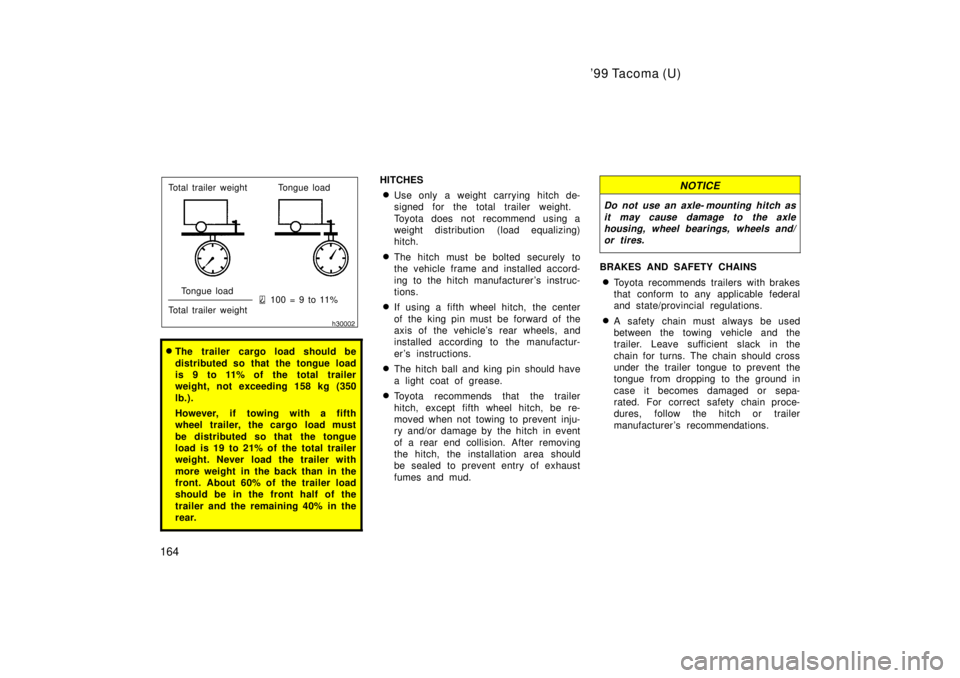
'99 Tacoma (U)
164
Total trailer weight
Total trailer weight Tongue load
Tongue load
100 = 9 to 11%
� The trailer cargo load should be
distributed so that the tongue load
is 9 to 11% of the total trailer
weight, not exceeding 158 kg (350
lb.).
However, if towing with a fifth
wheel trailer, the cargo load must
be distributed so that the tongue
load is 19 to 21% of the total trailer
weight. Never load the trailer with
more weight in the back than in the
front. About 60% of the trailer load
should be in the front half of the
trailer and the remaining 40% in the
rear.
HITCHES
� Use only a weight carrying hitch de-
signed for the total trailer weight.
Toyota does not recommend using a
weight distribution (load equalizing)
hitch.
� The hitch must be bolted securely to
the vehicle frame and installed accord-
ing to the hitch manufacturer 's instruc-
tions.
� If using a fifth wheel hitch, the center
of the king pin must be forward of the
axis of the vehicle's rear wheels, and
installed according to the manufactur-
er 's instructions.
� The hitch ball and king pin should have
a light coat of grease.
� Toyota recommends that the trailer
hitch, except fifth wheel hitch, be re-
moved when not towing to prevent inju-
ry and/or damage by the hitch in event
of a rear end collision. After removing
the hitch, the installation area should
be sealed to prevent entry of exhaust
fumes and mud.NOTICE
Do not use an axle- mounting hitch as
it may cause damage to the axlehousing, wheel bearings, wheels and/ or tires.
BRAKES AND SAFETY CHAINS
� Toyota recommends trailers with brakes
that conform to any applicable federal
and state/provincial regulations.
� A safety chain must always be used
between the towing vehicle and the
trailer. Leave sufficient slack in the
chain for turns. The chain should cross
under the trailer tongue to prevent the
tongue from dropping to the ground in
case it becomes damaged or sepa-
rated. For correct safety chain proce-
dures, follow the hitch or trailer
manufacturer 's recommendations.
Page 165 of 247
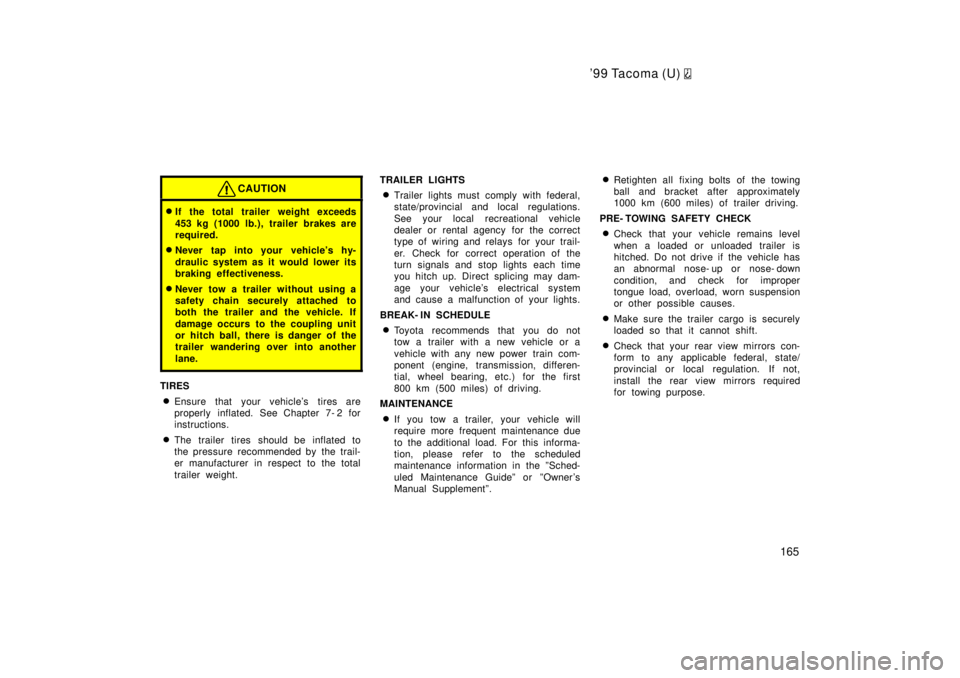
'99 Tacoma (U)
165
CAUTION
�If the total trailer weight exceeds
453 kg (1000 lb.), trailer brakes are
required.
� Never tap into your vehicle's hy-
draulic system as it would lower its
braking effectiveness.
� Never tow a trailer without using a
safety chain securely attached to
both the trailer and the vehicle. If
damage occurs to the coupling unit
or hitch ball, there is danger of the
trailer wandering over into another
lane.
TIRES
� Ensure that your vehicle's tires are
properly inflated. See Chapter 7- 2 for
instructions.
� The trailer tires should be inflated to
the pressure recommended by the trail-
er manufacturer in respect to the total
trailer weight. TRAILER LIGHTS
� Trailer lights must comply with federal,
state/provincial and local regulations.
See your local recreational vehicle
dealer or rental agency for the correct
type of wiring and relays for your trail-
er. Check for correct operation of the
turn signals and stop lights each time
you hitch up. Direct splicing may dam-
age your vehicle's electrical system
and cause a malfunction of your lights.
BREAK- IN SCHEDULE � Toyota recommends that you do not
tow a trailer with a new vehicle or a
vehicle with any new power train com-
ponent (engine, transmission, differen-
tial, wheel bearing, etc.) for the first
800 km (500 miles) of driving.
MAINTENANCE
� If you tow a trailer, your vehicle will
require more frequent maintenance due
to the additional load. For this informa-
tion, please refer to the scheduled
maintenance information in the ºSched-
uled Maintenance Guideº or ºOwner 's
Manual Supplementº. �
Retighten all fixing bolts of the towing
ball and bracket after approximately
1000 km (600 miles) of trailer driving.
PRE- TOWING SAFETY CHECK � Check that your vehicle remains level
when a loaded or unloaded trailer is
hitched. Do not drive if the vehicle has
an abnormal nose- up or nose- down
condition, and check for improper
tongue load, overload, worn suspension
or other possible causes.
� Make sure the trailer cargo is securely
loaded so that it cannot shift.
� Check that your rear view mirrors con-
form to any applicable federal, state/
provincial or local regulation. If not,
install the rear view mirrors required
for towing purpose.
Page 166 of 247

'99 Tacoma (U)
166
TRAILER TOWING TIPS
When towing a trailer, your vehicle will
handle differently than when not tow-
ing. The three main causes of vehicle-
trailer accidents are driver error, exces-
sive speed and improper trailer loading.
Keep these in mind when towing:
� Before starting out, check operation of
the lights and all vehicle- trailer connec-
tions. After driving a short distance,
stop and recheck the lights and con-
nections. Before actually towing a trail-
er, practice turning, stopping and back-
ing with a trailer in an area away from
traffic until you learn the feel.
� Backing with a trailer is difficult and
requires practice. Grip the bottom of
the steering wheel and move your hand
to the left to move the trailer to the
left. Move your hand to the right to
move the trailer to the right. (This pro-
cedure is generally opposite to that
when backing without a trailer). Also,
just turn the steering wheel a little at
a time, avoiding sharp or prolonged
turning. Have someone guide you when
backing to reduce the risk of an acci-
dent. �
Because stopping distance may be in-
creased, vehicle- to- vehicle distance
should be increased when towing a
trailer. For each 16 km/h (10 mph) of
speed, allow at least one vehicle and
trailer length between you and the ve-
hicle ahead. Avoid sudden braking as
you may skid, resulting in jackknifing
and loss of control. This is especially
true on wet or slippery surfaces.
� Avoid jerky starts or sudden accelera-
tion. If your vehicle has a manual
transmission, prevent excessive clutch
slippage by keeping engine rpm low
and not racing the engine. Always start
out in first gear.
� Avoid jerky steering and sharp turns.
The trailer could hit your vehicle in a
tight turn. Slow down before making a
turn to avoid the necessity of sudden
braking. �
Remember that when making a turn,
the trailer wheels will be closer than
the vehicle wheels to the inside of the
turn. Therefore, compensate for this by
making a larger than normal turning
radius with your vehicle.
� Crosswinds and rough roads will ad-
versely affect handling of your vehicle
and trailer, causing sway. Pay attention
to the rear from time to time to pre-
pare yourself for being passed by large
trucks or buses, which may cause your
vehicle and trailer to sway. If swaying
happens, firmly grip the steering wheel
and reduce speed immediately but
gradually. Never increase speed. Steer
straight ahead. If you make no extreme
correction with the steering or brakes,
the vehicle and trailer will stabilize.
Page 168 of 247
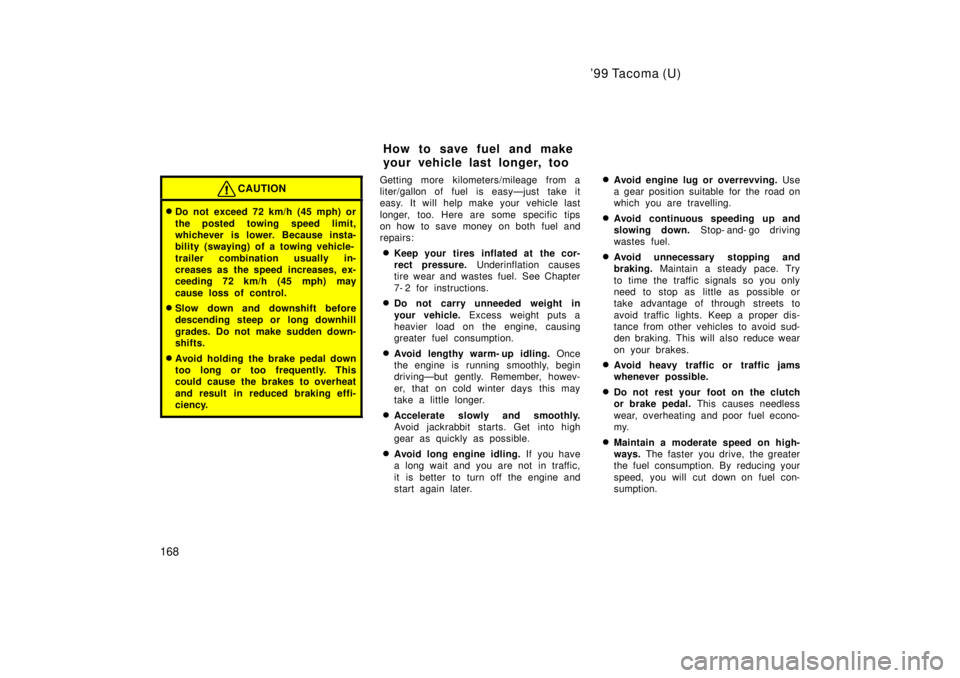
'99 Tacoma (U)
168
CAUTION
� Do not exceed 72 km/h (45 mph) or
the posted towing speed limit,
whichever is lower. Because insta-
bility (swaying) of a towing vehicle-
trailer combination usually in-
creases as the speed increases, ex-
ceeding 72 km/h (45 mph) may
cause loss of control.
� Slow down and downshift before
descending steep or long downhill
grades. Do not make sudden down-
shifts.
� Avoid holding the brake pedal down
too long or too frequently. This
could cause the brakes to overheat
and result in reduced braking effi-
ciency.
Getting more kilometers/mileage from a
liter/gallon of fuel is easyÐjust take it
easy. It will help make your vehicle last
longer, too. Here are some specific tips
on how to save money on both fuel and
repairs:
� Keep your tires inflated at the cor-
rect pressure. Underinflation causes
tire wear and wastes fuel. See Chapter
7- 2 for instructions.
� Do not carry unneeded weight in
your vehicle. Excess weight puts a
heavier load on the engine, causing
greater fuel consumption.
� Avoid lengthy warm- up idling. Once
the engine is running smoothly, begin
drivingÐbut gently. Remember, howev-
er, that on cold winter days this may
take a little longer.
� Accelerate slowly and smoothly.
Avoid jackrabbit starts. Get into high
gear as quickly as possible.
� Avoid long engine idling. If you have
a long wait and you are not in traffic,
it is better to turn off the engine and
start again later. �
Avoid engine lug or overrevving. Use
a gear position suitable for the road on
which you are travelling.
� Avoid continuous speeding up and
slowing down. Stop- and- go driving
wastes fuel.
� Avoid unnecessary stopping and
braking. Maintain a steady pace. Try
to time the traffic signals so you only
need to stop as little as possible or
take advantage of through streets to
avoid traffic lights. Keep a proper dis-
tance from other vehicles to avoid sud-
den braking. This will also reduce wear
on your brakes.
� Avoid heavy traffic or traffic jams
whenever possible.
� Do not rest your foot on the clutch
or brake pedal. This causes needless
wear, overheating and poor fuel econo-
my.
� Maintain a moderate speed on high-ways. The faster you drive, the greater
the fuel consumption. By reducing your
speed, you will cut down on fuel con-
sumption.
How to save fuel and make
your vehicle last longer, too
Page 171 of 247
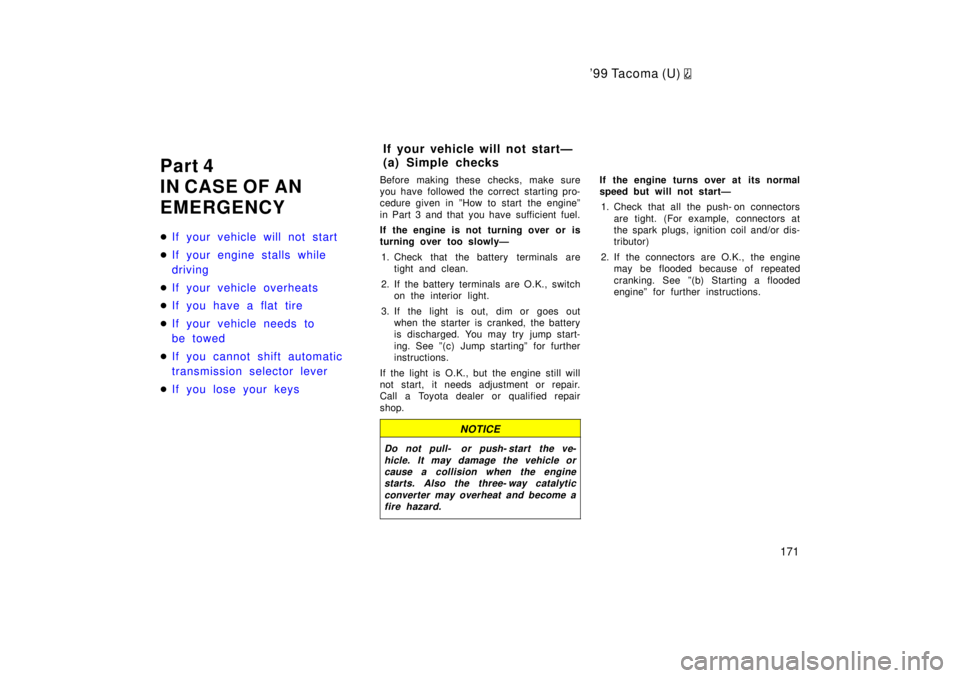
'9 9 Ta co ma (U)
171
Part 4
IN CASE OF AN
EMERGENCY �
If your vehicle will not start
�If your engine stalls while
driving
�If your vehicle overheats
�If you have a flat tire
�If your vehicle needs to
be towed
�If you cannot shift automatic
transmission selector lever
�If you lose your keys
Before making these checks, make sure
you have followed the correct starting pro-
cedure given in ºHow to start the engineº
in Part 3 and that you have sufficient fuel.
If the engine is not turning over or is
turning over too slowlyÐ
1. Check that the battery terminals are tight and clean.
2. If the battery terminals are O.K., switch on the interior light.
3. If the light is out, dim or goes out when the starter is cranked, the battery
is discharged. You may try jump start-
ing. See º(c) Jump startingº for further
instructions.
If the light is O.K., but the engine still will
not start, it needs adjustment or repair.
Call a Toyota dealer or qualified repair
shop.
NOTICE
Do not pull- or push- start the ve- hicle. It may damage the vehicle orcause a collision when the engine starts. Also the three- way catalytic
converter may overheat and become afire hazard.
If the engine turns over at its normal
speed but will not startÐ
1. Check that all the push- on connectors are tight. (For example, connectors at
the spark plugs, ignition coil and/or dis-
tributor)
2. If the connectors are O.K., the engine may be flooded because of repeated
cranking. See º(b) Starting a flooded
engineº for further instructions.
If your vehicle will not startÐ
(a) Simple checks
Page 172 of 247
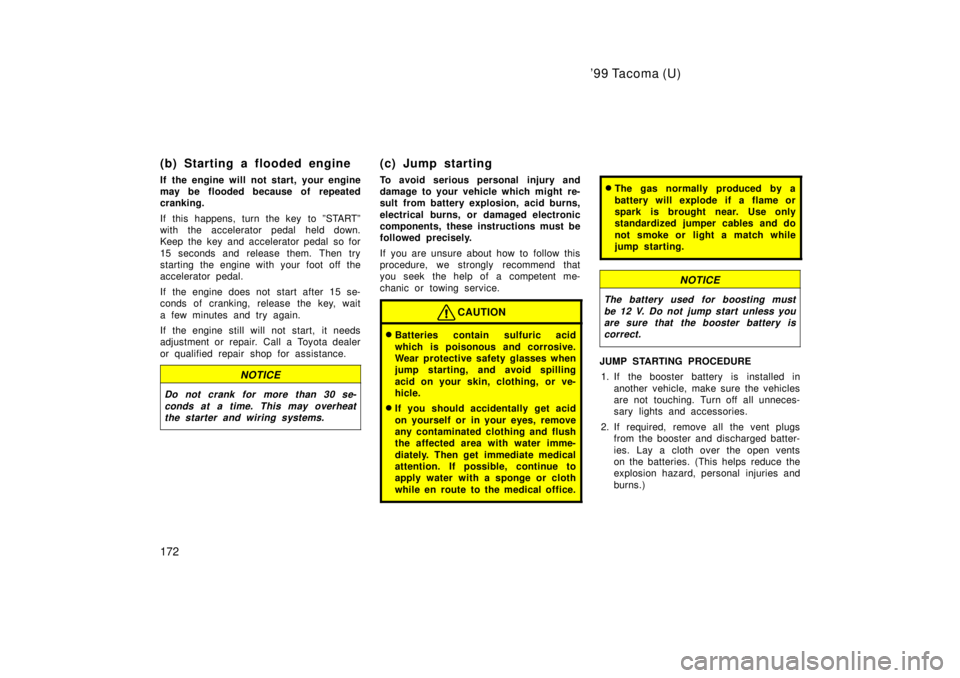
'99 Tacoma (U)
172
(b) Starting a flooded engine
If the engine will not start, your engine
may be flooded because of repeated
cranking.
If this happens, turn the key to ºSTARTº
with the accelerator pedal held down.
Keep the key and accelerator pedal so for
15 seconds and release them. Then try
starting the engine with your foot off the
accelerator pedal.
If the engine does not start after 15 se-
conds of cranking, release the key, wait
a few minutes and try again.
If the engine still will not start, it needs
adjustment or repair. Call a Toyota dealer
or qualified repair shop for assistance.
NOTICE
Do not crank for more than 30 se-
conds at a time. This may overheatthe starter and wiring systems.
(c) Jump starting
To avoid serious personal injury and
damage to your vehicle which might re-
sult from battery explosion, acid burns,
electrical burns, or damaged electronic
components, these instructions must be
followed precisely.
If you are unsure about how to follow this
procedure, we strongly recommend that
you seek the help of a competent me-
chanic or towing service.
CAUTION
� Batteries contain sulfuric acid
which is poisonous and corrosive.
Wear protective safety glasses when
jump starting, and avoid spilling
acid on your skin, clothing, or ve-
hicle.
� If you should accidentally get acid
on yourself or in your eyes, remove
any contaminated clothing and flush
the affected area with water imme-
diately. Then get immediate medical
attention. If possible, continue to
apply water with a sponge or cloth
while en route to the medical office.
�The gas normally produced by a
battery will explode if a flame or
spark is brought near. Use only
standardized jumper cables and do
not smoke or light a match while
jump starting.
NOTICE
The battery used for boosting must
be 12 V. Do not jump start unless youare sure that the booster battery is correct.
JUMP STARTING PROCEDURE
1. If the booster battery is installed in another vehicle, make sure the vehicles
are not touching. Turn off all unneces-
sary lights and accessories.
2. If required, remove all the vent plugs from the booster and discharged batter-
ies. Lay a cloth over the open vents
on the batteries. (This helps reduce the
explosion hazard, personal injuries and
burns.)